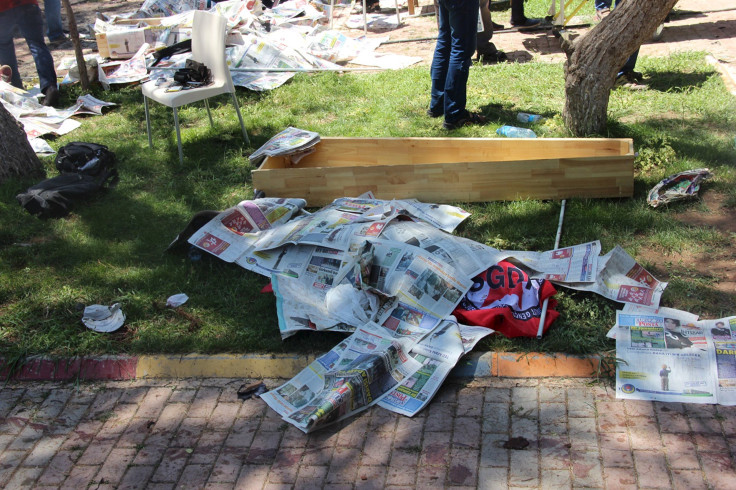Turkey’s Suruc Terrorist Attack Confirms Fears Of ISIS Presence, Power, Locals Say

On Monday, Salih stood on the outer edge of the circle of Kurdish protesters in the border town of Suruc, Turkey, where dozens of young men and women -- many of them his friends -- were calling for more help in rebuilding the beleaguered Syrian Kurdish town of Kobani, which has been ravaged by fighting during the Syrian civil war.
Salih and his friends, all of whom are Kurdish, had planned on traveling to Kobani to help the Kurdish military forces there rebuild schools and local municipal buildings following months of fighting with the Islamic State group, also known as ISIS. Throwing his fists in the air, Salih chanted along with the crowd: "We defended it together; we are building it together."
Mid-chant, a massive explosion propelled him into the air. Flying backward, Salih says all he could see while falling onto the pavement behind him was the blue sky and the littering of the "the feet and hands that had blown off"of his friends around him.
Turkish officials said Monday that at least 28 people had been killed in the suicide bombing attack outside the Amara Cultural Park in Suruc but that the death toll would likely rise. The Turkish Ministry of Interior put out a statement that more than 100 people were wounded and were receiving treatment at a nearby hospital.
"The police got to the scene before the ambulances, but they didn't help anyone right away. It's like they didn't know what to do," Salih says. A gruesome video circulated on social media confirms Salih's description of the scene. The video depicts men and women splayed by the bomb, their limbs scattering the tiled ground.
A Turkish official speaking to CNN on condition of anonymity said the government thinks the attack is "retaliation to the Turkish government's fight against terrorism."
"The death of citizens and the critical number of the injured as a result of this terror act saddens us," President Recep Tayyip Erdogan said in press conference Monday afternoon in Cyprus. "Terror should be cursed wherever it comes from; it has no religion, race, nationality or land."

No one has claimed responsibility for the attack yet, but locals say they have no doubt that ISIS is responsible. The Sunni terrorist organization has for more than a year controlled land on the northern Syrian border with Turkey and until recently, controlled the town of Kobani, which sits just six miles from the center of Suruc.
"I had seen a man walking into the crowd with ISIS-style clothing on," Salih says with a shaky voice. "I know it was ISIS. I have no doubt about that."
Another onlooker told International Business Times that the bomber's body had been "shredded into pieces" but that most people helping to clean the scene assume the attacker was a women. ISIS is not known for its use of female suicide bombers. Still, residents of Suruc said they knew that an ISIS attack in their town was possible -- imminent, even, after the attack on the pro-Kurdish party's election rally in Diyarbakir on June 5.
Tuesday's attack is a reminder for the people of southern Turkey, Salih says, that despite the Turkish government's promise to secure its border and its people, Syria's war has undoubtedly crept into the country.
The Turkish people living in southeastern Turkey, the majority of them Kurdish, experienced their first massive terror attack by ISIS in May 2013. The Sunni militant group detonated two car bombs in front of government buildings in the border town of Reyhanli. The attack killed 51 people. The Reyhanli bombing took place at a time when ISIS was still trying to established itself in Syria and had just begun recruiting from within Syrian refugee camps on the Turkish border.
Now, that system is much more established, says one Kurdish politician from Suruc who requested to remain anonymous for security reasons, and ISIS militants now, more than ever, are streaming in through the border with Syria.
"ISIS threatened to bomb Suruc three or four days ago," the official said. "Police checkpoints were set up around the city but not inside."
Men and women from across Turkey took to the streets to condemn the attack. Thousands of people marched down Istiklal Street in Istanbul, chanting anti-government slogans. Many people are blaming the government for working with ISIS, Salih said.
Meanwhile in Suruc, the Kurdish official said she was still at the scene overseeing the transfer of the mangled bodies to the local morgue.
"They were all just so young," she said through the chants of the men and women nearby. "They just wanted to build a playground for the kids in Kobane."
Dilara Çelik contributed reporting from Turkey.
© Copyright IBTimes 2024. All rights reserved.





















